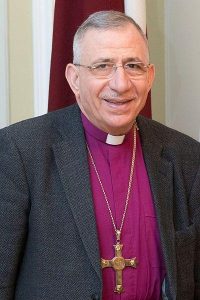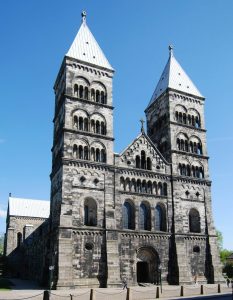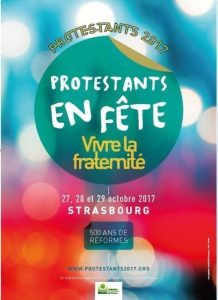2017, a favourable context
The 400th anniversary of the Reformation had World War I as a context. In such conditions, the 1917 Jubilee saw few celebrations and publications, and were marked by strong nationalist feelings. In France the mistrust of Luther, a German, was visible. In Germany on the contrary this status was a source of pride.
It resulted in many lasting misunderstandings and confusions. But in 1934, Dietrich Bonhöffer and the Confessing Church challenged Hitler who wanted to bring German Protestants to heel.
After World War II, France reconciled with both Germanies, namely the Federal Republic of Germany and the German Democratic Republic. In 1958, with the implementation of the Treaty of Rome, the construction of Europe began.
The Ecumenical Council of Churches was created in 1948.
Thus a better informed image of Luther and the Reformation, especially in its theological dimension, replaced the misunderstandings provoked by both World Wars.
After 1950 ecumenism moved forward. Vatican II Council (1962-1965) paved the way for ecumenical progress with the Catholics.
Two significant Anglo-Catholic texts referred to the celebration of the Reformation:
– the first one because of the date and place where it was signed, in Augsburg on 31 October 1999, marking the joint Declaration of the World Lutheran Federation and the Catholic Church on the doctrine of justification,
– the second one because it explicitly dealt with preparing the commemorative year of the Reformation: it was the 2013 document From « Conflict to Communion ».
In 2017 the context naturally enabled peaceful celebrations to commemorate the Reformation. The celebrations were at once more solemn, more numerous and drew more participants than those of the previous centuries, and for the first time the Catholic Church attended some of them.
Celebrations of the 500th anniversary throughout Europe
They were characterised by their ecumenical aspect, starting with the launching of the 500th anniversary of the Reformation by both the president of the World Lutheran Federation, Munib A. Younan, and Pope Francis, in Lund Cathedral in Sweden, on 31 October 2016.
Of course, the anniversary was celebrated in Germany, notably at the Kirchentag, and in Wittenberg with the Reformation Universal Exhibition.
It was also celebrated in numerous other countries.
In Belgium the United Protestant Church celebrated the 500th anniversary of the Reformation in Brussels cathedral at the invitation of Cardinal De Kesel.
In Switzerland many events were organised:
- In Bern a pageant about the history of the Reformation and a celebration of the Reformation brought together representatives of the Swiss Federation of Protestant Churches and some Christians of other denominations,
- in Geneva with the Catholics, where the commitment to ecumenism was reasserted,
- and in many other cities.
Celebrations of the 500 years in France
In France the anniversary was marked with many events all over the country throughout the year 2017. Events in Strasbourg and La Rochelle were particularly spectacular, but many parishes organised lectures, concerts, theatre plays, exhibitions…
Among the symposiums, one should mention:
- the symposium organised by the French Protestant Federation at the Paris town hall on 22-23 September attended by Emmanuel Macron, the President of the Republic, where he made a very noteworthy speech.
- The symposium organised in Strasbourg by the Protestant faculty of the University of Strasbourg along with the Centre for ecumenical studies on the subject: ‘Our whole lives are penance – the 95 theses of Martin Luther’ from 27 to 29 April.
- The symposium organised by the free theology faculty of Vaux-sur-Seine entitled: ‘the Epistle to the Romans debated over through the centuries’ on 9-10 June.
Festive times:
On 27-28-29 October in Strasbourg, Protestants in celebration organised by the French Federation on the theme ‘Long live fraternity’.
On 28,29,30 July in the Cévennes area, at Mialet, an important light and sound show with 300 bit players was entitled ‘From Luther to Luther King’.
The theatre show of the Company of the Patty-cake toured all over France.
Many books were published in the year 2017. One should mention:
Martin Luther by Matthieu Arnold, published by Fayard, and the book The Protestants 500 years after the Reformation, under the direction of pastor Michel Bertrand, published by Olivétan.
One should also mention the cantata created by Samuel Sandmeier for the jubilee of the Reformation in Montbéliard, on a libretto written by Pascal Schumacher and Béatrice Verry. And also the creation of an opera entitled: ‘Luther or the beggar of Grace’ mainly performed in Alsace.
More information is available on the web-site: www.protestants2017.org









